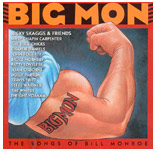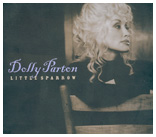
Whether the Coen Brothers' whimsical Appalachian "Odyssey" becomes the catalyst for a folk revival the way "The Sting" did for ragtime remains to be seen, but at the very least this fascinating collection gives a welcome airing to some of American music's most seminal components, from prison-gang hollers to children's sing-alongs. Although it's dominated by artists mostly associated with bluegrass, the "O Brother" soundtrack covers an era that slightly predates that style, as befits a movie set in 1937.
At least four generations are represented (along with voices from much further in the past): bluegrass patriarch Ralph Stanley, veterans such as Norman Blake and John Hartford, neo-trad practitioners like Alison Krauss and Gillian Welch, and the Munchkin-voiced Peasall Sisters (average age eight and a half). But the years fade away as the artists converge on an old-timey repertoire of sparsely arranged, vocally oriented songs that hark back to a pre-commercial time when singing was as integral an element of people's lives as work, love and religion, all of which it encompassed. This isn't folk music, it's folks' music.
Highlights include multiple versions of "Man of Constant Sorrow," "Man of Constant Sorrow," particularly those by the Soggy Bottom Boys (actually, varying configurations of Union Station and friends); Chris Thomas King's bluesy "Hard Time Killing Floor Blues"; "I'll Fly Away," by Alison Krauss and Gillian Welch; and Ralph Stanley's a cappella version of "O Death," a stark, primordial Appalachian apparition. But even such an unvarnished evocation of mortality doesn't cast a shadow over the collection's — and the film's — overall mood of sweet melancholy, encapsulated by Harry McClintock's 1928 recording of "Big Rock Candy Mountain." Not only is there "You Are My Sunshine" and "Keep on the Sunny Side," but "Man of Constant Sorrow" takes on an increasingly jaunty tone with each reprise, as if to affirm that the best thing about that purely American sentiment called the blues is singing them.

|
"Big Mon: The Songs of Bill Monroe," Ricky Skaggs & Friends
If anyone was qualified for the job of assembling a Bill Monroe tribute, it was Ricky Skaggs. A virtuoso mandolinist and multi-instrumentalist who was playing with Ralph Stanley by the age of 16, Skaggs shared the stage with Monroe when still a child, and has been delivering on that promise ever since. For "Big Mon," Skaggs has reached well beyond the predictable bluegrass circles, and the success of the enterprise is a testament to the unassailable quality of Monroe's craft as much as the contributions of the individual performers.
Dealing in substance rather than style, "Big Mon" is more concerned with exploring the possibilities of Monroe's songs than strictly rendering them in the idiom that he invented, which may explain the shortage of instrumentals or breakneck showstoppers; there is a hoedown finale of "Big Mon" but no "Uncle Pen," "Rawhide" or "Hoppin' John." What we do get is Bruce Hornsby turning in an unexpectedly effective, moody version of "Darlin' Corey," John Fogerty lending the Creedence treatment to "Blue Moon of Kentucky," and the Dixie Chicks showing off creditable playing skills in their duet with Skaggs on "Walk Softly," which has been nominated for a Grammy. And those who associate Travis Tritt and Charlie Daniels with more heavy-handed material may see them in a different light after hearing their contributions, especially Tritt's modest but nifty banjo playing on "My Little Georgia Rose." It's refreshing to see these Nashville creations show off something that resonates beyond TNN, and one wonders whether many of their pop counterparts would have any such reserves of experience from which to draw.
Ultimately, not much needs to be done to make these timeless tunes come to life, and since all of the contributors do solid work, what ends up standing out is a function of the song at hand — there's no faulting Patty Loveless and Dwight Yoakam, but their selections are less memorable than "Blue Night" (Mary Chapin Carpenter), "On the Old Kentucky Shore" (Joan Osborne & Ricky Skaggs) and especially Dolly Parton's rendering of "Cry, Cry Darlin'," a standout by any standard.
Bill Monroe was not, by all accounts, a man prone to touchy-feely sentimentality, but were he still with us, it's hard to imagine that the father of bluegrass wouldn't be tickled by these young 'uns.

|
"Little Sparrow," Dolly Parton
Dolly Parton's second fling with bluegrass follows on the clog heels of last year's excellent "The Grass Is Blue," and if it falls a bit short of its predecessor's headlong exhilaration, it still delivers a good helping of the right stuff. Chief among its virtues is the killer band that Parton has mostly retained from the first album, especially the remarkable Jerry Douglas on dobro and Stuart Duncan on fiddle. The ease with which these young veterans propel winners such as "Seven Bridges Road" carries over to and elevates less inspiring selections like Collective Soul's "Shine," and when Dolly and her boys kick in with all cylinders as they do on a bona fide classic like the Louvin Brothers' "I Don't Believe You've Met My Baby," there just isn't anything better to be found. This crew swings like a wrecking ball, and tosses off a creditable version of Cole Porter's "I Get a Kick Out of You" as if to prove it.
Parton's typically fine, heart-on-her sleeve vocals put the stamp of character on these timeless tunes, bolstered by frequent pairings with Alison Krauss, who serves as a particularly strong foil. Dolly's commitment to her new direction is further borne out by the seven songs she wrote herself, which may well account for the more personal, introspective quality that distinguishes this CD from its predecessor. "Little Sparrow" explores the darker, more fable-like side of the genre; there are repeated references to infant deaths and faithless lovers, and both the title track and her collaboration with the Irish band Altan on her 30-year-old "Down From Dover" evoke the appropriate sense of dread. But in the most ambitious of these efforts, the mountain-gothic "Mountain Angel," Parton's narrative of a woman driven mad by grief is undercut by her cutesy, breathy delivery, a rare misstep for this most intuitive of singers.
Still, Dolly's bluegrass incarnation is one of the more exciting makeovers of recent years in country or any other kind of music, and "Little Sparrow" is a valuable addition to one of America's most enduringly vital genres.
